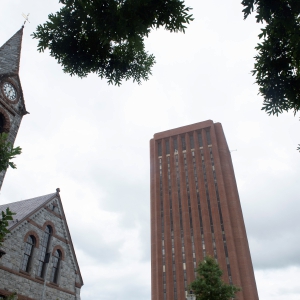Guest columnist Josh Schimmel: Investment in water — Better now than later
| Published: 07-06-2023 3:09 PM |
With the passage of many public fiscal year budgets, it is a good time to reflect on what these budgets support and the values they reflect. As we do so, consider what could be more central to our quality of life, public health, economy, agriculture, and tourism than water. Water is part of our identity and our sense of place. After all, our home is the Connecticut River Valley.
Public water and wastewater systems up and down the Valley provide the safe, reliable drinking water and clean waterways that are essential to our daily lives and livelihoods. Around the clock, they perform a complex balancing act relying on an intricate network of pipes and pumping stations, water and wastewater treatment plants, watersheds, reservoirs and wells.
In our region, most of this crucial infrastructure is more than 50 years old, and some of it more than a century old. For a long time, this infrastructure worked well — for the average person, it was out of sight, out of mind, and (mostly) out of the news. But like any road, bridge or school, no infrastructure lasts forever. Today there are growing challenges facing local and regional water systems — not just aging and failing infrastructure, but new contaminants to treat and remove, new regulations with which to comply, and impacts associated with more frequent extreme weather patterns.
Equally challenging is finding the next generation of dedicated public servants who will run these systems around the clock, 365 days a year to ensure you will always be able to get a clean, safe glass of water from the faucet into the future. All of this comes at a cost, a cost that is supported by our local water and wastewater bills.
In the lower Pioneer Valley, the Springfield Water and Sewer Commission’s regional drinking water and wastewater plants have begun to show their age. Failures of equipment and non-compliance with drinking water regulations are more frequent due to reliance on infrastructure and technology that was last modernized in the 1970s.
The commission is proactively investing in a systemwide upgrade of critical water infrastructure, most notably a new drinking water treatment plant. These upgrades are being designed and built to serve for the next 50-plus years and account for regulatory and environmental change. To help build the future water workforce that will operate these upgrades, the commission has also established a new paid summer internship program for Springfield high school students.
Of course, these upgrades also come at a cost. But in contrast with the 1970s, there is little direct federal or state funding to offset the local impact. Unlike roads, bridges, or schools, almost all federal or state funding assistance for water infrastructure available today is primarily in the form of loans. In this context, the commission has planned predictable and stable rate increases to finance critical upgrades, the majority of which will be completed over the next six years.
Other Valley communities may find themselves in similar situations soon, if they are not already. But a universal fact is that deferring investment will only further increase costs in the future — costs that will be felt not only in terms of our water bills, but in the form of adverse effects on public health, the economy and our quality of life.
Article continues after...
Yesterday's Most Read Articles
 More than 130 arrested at pro-Palestinian protest at UMass
More than 130 arrested at pro-Palestinian protest at UMass
 ‘Knitting treasure’ of the Valley: Northampton Wools owner spreads passion for ancient pastime
‘Knitting treasure’ of the Valley: Northampton Wools owner spreads passion for ancient pastime
 UMass student group declares no confidence in chancellor
UMass student group declares no confidence in chancellor
 Guest columnist Josh Silver: Northampton school budget — Let’s start with kindness, accuracy and respect
Guest columnist Josh Silver: Northampton school budget — Let’s start with kindness, accuracy and respect
 With Jones project in question, Amherst won’t sign lease for temporary digs
With Jones project in question, Amherst won’t sign lease for temporary digs
 UMass graduation speaker Colson Whitehead pulls out over quashed campus protest
UMass graduation speaker Colson Whitehead pulls out over quashed campus protest
Every community is and rightfully should be concerned with the affordability of these essential services — without access to water, daily life as we know it comes to a halt. The commission provides a number of programs to assist the elderly and those that struggle to afford their bills. The real question before us now is whether we pay the current cost of investment in safe drinking water and clean waterways, or would we rather pay the future cost of underinvestment?
National headlines have provided many examples of the consequences of the latter choice, with water-related disasters most prominently experienced recently in Jackson, Mississippi. So, as we consider the value of our essential water and wastewater services, let us not forget, we can’t afford not to invest now in maintaining safe, reliable, clean water. An investment in water is an investment in our communities and in our future.
Josh Schimmel is executive director of the Springfield Water and Sewer Commission.

 Columnist Olin Rose-Bardawil: American dream out of reach for many
Columnist Olin Rose-Bardawil: American dream out of reach for many Tony Giardina: Faith and inclusion
Tony Giardina: Faith and inclusion Martha Jorz: Stop supporting UMass and Raytheon
Martha Jorz: Stop supporting UMass and Raytheon Doron Goldman: Israel's situation is complicated
Doron Goldman: Israel's situation is complicated
